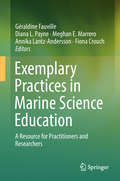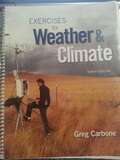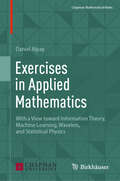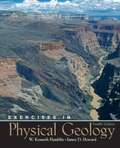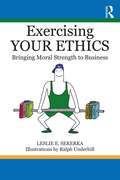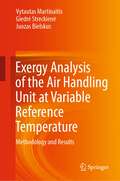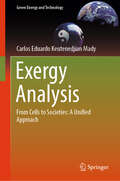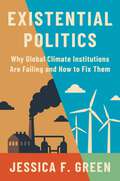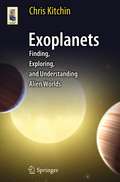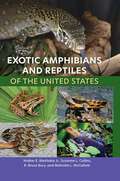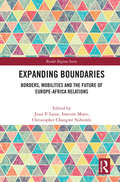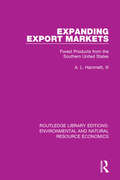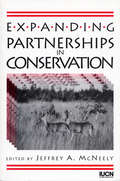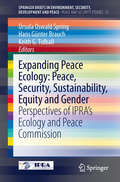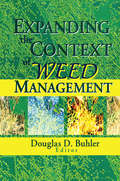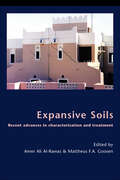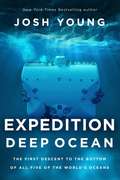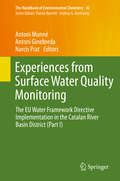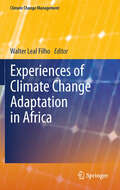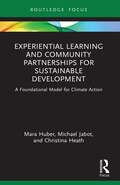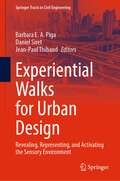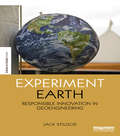- Table View
- List View
Exemplary Practices in Marine Science Education: A Resource for Practitioners and Researchers
by Géraldine Fauville Diana L. Payne Meghan E. Marrero Annika Lantz-Andersson Fiona CrouchThis edited volume is the premier book dedicated exclusively to marine science education and improving ocean literacy, aiming to showcase exemplary practices in marine science education and educational research in this field on a global scale. It informs, inspires, and provides an intellectual forum for practitioners and researchers in this particular context. Subject areas include sections on marine science education in formal, informal and community settings. This book will be useful to marine science education practitioners (e.g. formal and informal educators) and researchers (both education and science).
Exercises and Problems in Mathematical Methods of Physics (Undergraduate Lecture Notes in Physics)
by Giampaolo CicognaThis book is the second edition, whose original mission was to offer a new approach for students wishing to better understand the mathematical tenets that underlie the study of physics. This mission is retained in this book.The structure of the book is one that keeps pedagogical principles in mind at every level. Not only are the chapters sequenced in such a way as to guide the reader down a clear path that stretches throughout the book, but all individual sections and subsections are also laid out so that the material they address becomes progressively more complex along with the reader's ability to comprehend it. This book not only improves upon the first in many details, but it also fills in some gaps that were left open by this and other books on similar topics. The 350 problems presented here are accompanied by answers which now include a greater amount of detail and additional guidance for arriving at the solutions. In this way, the mathematical underpinnings of the relevant physics topics are made as easy to absorb as possible.
Exercises for Weather & Climate
by Greg CarboneExercises for Weather & Climate encourages readers to review important ideas and concepts of meteorology through problem solving, simulations, and guided thinking. Available for use standalone or with Pearson’s introductory meteorology textbooks, the graphics program and computer-based simulations and tutorials help readers grasp key meteorology concepts. Now with integrated links to mobile-enabled Pre-Lab Videos, and assignable Pre- and Post-Lab quizzes in MasteringMeteorology, this manual and technology program is designed to complement any introductory meteorology or weather and climate course.
Exercises in Applied Mathematics: With a View toward Information Theory, Machine Learning, Wavelets, and Statistical Physics (Chapman Mathematical Notes)
by Daniel AlpayThis text presents a collection of mathematical exercises with the aim of guiding readers to study topics in statistical physics, equilibrium thermodynamics, information theory, and their various connections. It explores essential tools from linear algebra, elementary functional analysis, and probability theory in detail and demonstrates their applications in topics such as entropy, machine learning, error-correcting codes, and quantum channels. The theory of communication and signal theory are also in the background, and many exercises have been chosen from the theory of wavelets and machine learning. Exercises are selected from a number of different domains, both theoretical and more applied. Notes and other remarks provide motivation for the exercises, and hints and full solutions are given for many. For senior undergraduate and beginning graduate students majoring in mathematics, physics, or engineering, this text will serve as a valuable guide as theymove on to more advanced work.
Exercises in Electricity and Magnetism: 100 Examples and 400 Exercises
by Teruo MatsushitaThis book covers a great variety of problems on electricity and magnetism described in the textbook, "Electricity and Magnetism", in which superconductors are classified as one kind of magnetic materials. These problems will be helpful for a deeper understanding of the E-B analogy through a comparison between static electric and magnetic phenomena. Additionally, the usefulness of the vector potential is widely introduced. For example, the vector potential is directly used to determine the induced electromotive force. The author provides various exercises that are not covered in the textbook. The Poynting vector is useful for understanding the energy flow into capacitors or transmission lines during a charging process or into resistors during a dissipation process. A comparison between normal conducting and superconducting transmission lines shows a clear difference in the energy flow, although the final stored magnetic energy is the same. The electromagnetic potential of electromagnetic transverse electric (TE) and transverse magnetic (TM) waves in a waveguide also presents an interesting difference: The electric potential is zero in one case and non-zero in the other case. The reason for such a difference is explored. The relationship between the electric charge and electric current induced on the conductor surface is investigated for an electromagnetic wave in a waveguide or for that reflected on a conductor surface. This exercise book can be used together with the textbook 'Electricity and Magnetism' by the same author.
Exercises in Physical Geology (12th Edition)
by W. Kenneth Hamblin James D. HowardThis lab manual represents by far the best collection of photos of rocks and minerals-and one of the best compilations of exercises-available. With exercises using maps, aerial photos, satellite imagery, and other materials, this classic manual encompasses all the major geologic processes as well as the identification of rocks and minerals. The book is very useful for lab courses in Physical Geology.
Exercising Your Ethics: Bringing Moral Strength to Business
by Leslie E. SekerkaThrough a witty and engaging style the author invites readers to consider their character authenticity at work. The book is for people who want to do the right thing, but may not be sure what that means, how to go about it, or how to withstand the forces that may push them away from wanting to be ethical. In a world that seems to reward winning, regardless of how it is achieved, we need a clearer reason for wanting to be and become our best selves. Poking fun at the ironies and hypocrisies of human behavior, Exercising Your Ethics prompts you to leverage techniques that will help you become more deliberate about choosing value-driven actions. Exercising Your Ethics explains the messy business of workplace ethics in a way that is relatable and relevant. Readers will learn to build moral strength and encourage its development in others, while also recognizing moral vulnerability traps. It is an ideal resource for adult business education and training in academic or organizational settings. Educators, HR professionals, team leaders, coaches, and trainers will find the book a guide for competency development and as a way to prompt reflective discourse. Illustrator Ralph Underhill produces cartoons for a diverse number of social and environmental movements. He has a particular interest in using artistic communications to motivate positive change.
Exergy Analysis of the Air Handling Unit at Variable Reference Temperature: Methodology and Results
by Vytautas Martinaitis Giedrė Streckienė Juozas BielskusThis book explore how exergy analysis can be an important tool for assessing the sustainability of buildings.Building's account or around 40 percent of total energy conditions depending on local climatic conditions. Due to its nature, exergy analysis should become a valuable tool for the assessment of building sustainability, first of all considering their scope and the dependence of their energy demands on the local environmental and climatic conditions.Nonetheless, methodological bottlenecks do exist and a solution to some of them is proposed in this monograph. First and foremost, there is the still-missing thermodynamically viable method to apply the variable reference environment temperature in exergy analysis. The monograph demonstrates that a correct approach to the directions of heat exergy flows, when the reference temperature is considered variable, allows reflecting the specifics of energy transformation processes in heating, ventilation, and air conditioning systems in a thermodynamically viable way. The outcome of the case analysis, which involved coordinated application of methodologies based on the Carnot factor and coenthalpies, was exergy analysis indicators – exergy efficiency and exergy destroyed – obtained for air handling units and their components. These methods can be used for the purposes of analysing and improving building technical systems that, as a rule, operate at a variable environment temperature. Exergy analysis becomes more reliable in designing dynamic models of such systems and their exergy-based control algorithms. This would improve the possibility to deploy them in building information modelling (BIM) technologies and the application of life cycle analysis (LCA) principles in designing buildings, thus improving the quality of the decision-making process. Furthermore, this would benefit other systems where variable reference environment plays a key role.This book is relevant to academics, students and researchers in the field of thermodynamic analysis considering HVAC equipment, building energy systems, energy efficiency, sustainable development of technical systems of energy, mechanics, and construction, as well as preservation of natural resources. Planners, designers, engineers of HVAC equipment, building energy systems, and developers of appropriate simulation tools (e.g., BIM) will also find it of use.
Exergy Analysis: From Cells to Societies: A Unified Approach (Green Energy and Technology)
by Carlos Eduardo Keutenedjian MadyThis book explores the application of the second law of thermodynamics to a variety of systems beyond the typical evaluation of thermal machines. It utilizes quality indicators as tools for diagnosing different energy conversion systems, addressing issues ranging from system failures to the rational use of energy in society. The analysis is divided into two types: the first from the skin to the core of a biological system, and the other from the skin to the environment, known as society exergy analysis. The latter is a new field currently being developed.
Existential Politics: Why Global Climate Institutions Are Failing and How to Fix Them
by Jessica F. GreenA new way to tackle the real politics of climate change through asset revaluationIt&’s no secret that the Paris Agreement and voluntary efforts to address climate change are failing. Governments have spent three decades crafting international rules to manage the climate crisis yet have made little progress on decarbonization. In Existential Politics, Jessica Green explains why this is unsurprising: governments have misdiagnosed the political problem of climate change, focusing relentlessly on measuring, reporting, and trading emissions. This technical approach of &“managing tons&” ignores the ways that climate change and climate policy will revalue assets, creating winners and losers. Policies such as net zero, carbon pricing, and offsets all cater to the losers—owners of fossil assets.Ultimately, Green contends, climate change is a political problem. Climate politics should be understood as existential—creating conflicts that arise when some actors face the prospect of the devaluation or elimination of their assets or competition from the creation of new ones. Fossil asset owners, such as oil and gas companies and electric utilities, stand to lose trillions in the energy transition. Thus, they are fighting to slow decarbonization and preserve the value of their assets. Green asset owners, who will be the basis of the decarbonized economy, are fewer in number and relatively weak politically.Green proposes using international tax, finance, and trade institutions to create new green asset owners and constrain fossil asset owners, reducing their clout. Domestic investments in green assets, facilitated by global trade rules, can build the political power of green asset owners.
Exkursionen und Exkursionsdidaktik in der Hochschullehre: Erprobte und reproduzierbare Lehr- und Lernkonzepte
by Astrid Seckelmann Angela HofWelche Möglichkeiten gibt es, jenseits von klassischen Führungen Wissen zu vermitteln? Wie motiviere ich erwachsene Lernende zum Mitarbeiten auf einer Exkursion? Welche Kompetenzen kann ich im Gelände schulen? Das vorliegende Buch bietet Ihnen systematische, lehr- und lerntheoretische fundierte Arbeitshilfen für die Vorbereitung und Durchführung von Exkursionen, zudem Anregungen für die Exkursionsgestaltung in verschiedenen Arbeitsbereichen. Es zeigt auf, wie didaktische Möglichkeiten mit institutionellen Gegebenheiten in Einklang gebracht werden können. Sie erfahren, wie die unterschiedlichen Optionen, einen Raum zu begehen, die Umwelt zu interpretieren oder kulturelle Praktiken zu erkennen in eine strukturierte, zielorientierte Lehrveranstaltung umgesetzt werden können. Das Buch eröffnet Ihnen eine breite Palette innovativer Zugänge zu Exkursionen und liefert dazu konkrete Beispiele für Lehr- und Lernmaterialien. Praktische Tipps zu Voraussetzungen, Kosten, Vorbereitungs-, Durchführungs- und Nachbereitungsaufwand runden die Beiträge ab und geben Ihnen eine optimale Starthilfe für die Konzeption, Planung und Durchführung eigener Exkursionen.
Exoplanets
by C. R. KitchinExoplanets: Finding, Exploring, and Understanding Alien Worlds probes the basis for possible answers to the fundamentals questions asked about these planets orbiting stars other than our Sun. This book examines what such planets might be like, where they are, and how we find them. Until around ten years ago, the only planets that we knew about were within the Solar System. The first genuine planet beyond the confines of the Solar System was discovered only 1988. Since then another 350 or so exoplanets have been detected by various methods, and most of these haven been found in the last ten years. Although many more exoplanets discoveries may be expected to occur even as this book is being read, a large enough data set is now available to form the basis for an informed general account of exoplanets. The topic hence is an extremely "hot" one - all the more so because the recently launched Kepler spacecraft should soon start uncovering many more exoplanets, some perhaps comparable with the Earth (and therefore possibly alternative homes for mankind, if we could ever reach them). Exoplanets: Finding, Exploring, and Understanding Alien Life gives a comprehensive, balances, and above all accurate account of exoplanets.
Exotic Amphibians and Reptiles of the United States
by Walter E. Meshaka Jr. Suzanne L. Collins R. Bruce Bury Malcolm L. McCallumThe first complete field guide to the exotic amphibians and reptiles established in the continental United States and Hawaiʻi, this volume covers 74 species that are not native to the country and 29 species that are native but occur beyond their original geographic range. Dispersed from their former habitats by human activity, many of these species are invasive in their new environments, causing ecological or economic harm. Ideal for naturalists of all levels, Exotic Amphibians and Reptiles of the United States details each species’ taxonomy, distribution, history, and ecology and portrays each one with vibrant photographs. Drawing on county-level distribution maps from 2,908 published records, this guide provides an in-depth understanding of local factors that drive the success of exotic species. It connects species-specific information to conservation issues as it explores human causes of exotic and invasive establishment. The book also includes eight invited essays which provide regional perspectives on scientific, economic, and management-related aspects of this phenomenon. As ecological pressures on native species and habitats increase, understanding the histories and roles of exotic species is becoming more and more important for conservation efforts. Providing practical identification skills and an awareness of the environmental impacts of these amphibians and reptiles, this indispensable guide equips readers to confront the unusual biodiversity crisis of exotic species.
Expanding Boundaries: Borders, Mobilities and the Future of Europe-Africa Relations (Border Regions Series)
by Jussi P. LaineThis book challenges the common European notions about African migration to Europe and offers a holistic understanding of the current situation in Africa. It advocates a need to rethink Africa-Europe relations and view migration and borders as a resource rather than sources of a crisis. Migrant movement from Africa is often misunderstood and misrepresented as invasion caused by displacement due to poverty, violent conflict and environmental stress. To control this movement and preserve national identities, the EU and its various member states resort to closing borders as a way of reinforcing their migration policies. This book aims to dismantle this stereotypical view of migration from Africa by sharing cutting-edge research from the leading scholars in Africa and Europe. It refutes the flawed narratives that position Africa as a threat to the European societies, their economies and security, and encourages a nuanced understanding of the root causes as well as the socioeconomic factors that guide the migrants’ decision-making. With chapters written in a concise style, this book brings together the migration and border studies in an innovative way to delve into the broader societal impacts of both. It also serves to de-silence the African voices in order to offer fresh insights on African migration – a discourse dominated hitherto by the European perspective. This book constitutes a valuable resource for research scholars and students of Border Studies, Migration Studies, Conflict and Security Studies, and Development Studies seeking specialisation in these areas. Written in an accessible style, it will also appeal to a more general public interested in gaining a fuller perspective on the African reality.
Expanding Export Markets: Forest Products from the Southern United States (Routledge Library Editions: Environmental and Natural Resource Economics)
by A. L. HammettOriginally published in 1996. In order to increase exports and expand profits, U. S. manufacturers must be able to adapt to changing competitive pressures. This book presents methods to quantify competition and help predict profitability to help hardwood lumber manufacturers adapt to changing market conditions based on three research studies. This title will be of interest to students of environmental economics.
Expanding Partnerships in Conservation: Science, Trends, And The Challenge Of Sustainability
by Jeffrey A. McneelyProtected areas around the globe national parks, wildlife reserves, biosphere reserves will prosper only if they are supported by the public, the private sector, and the full range of government agencies. Yet such support is unlikely unless society appreciates the importance of protected areas to its own interest, and the protected areas are well-managed and contribute to the national welfare in a cost-effective way.A crucial foundation for success is full cooperation between individuals and institutions. Based on papers presented at the IVth World Congress on National Parks and Protected Areas, Expanding Partnerships in Conservation explores how new and stronger partnerships can be formed between managers of protected areas and other sectors of society. It describes a range of activities currently underway in many parts of the world that are intended to improve conservation efforts at the international, national, and local levels.
Expanding Peace Ecology: Peace, Security, Sustainability, Equity and Gender
by Keith G. Tidball Úrsula Oswald Spring Hans Günter BrauchThis book has peer-reviewed chapters by scholars from Australia, Canada, Germany, Japan, Mexico and the USA that were presented to the Ecology and Peace Commission (EPC) of the International Peace Research Association (IPRA) in November 2012 in Japan. The chapters address these themes: Expanding Peace Ecology - Peace, Security, Sustainability, Equity and Gender; Two Discourses on Global Climate Change Impacts: From Climate Change and Security to Sustainability Transition; Peace Research and Greening in the Red Zone: Community-based Ecological Restoration to Enhance Resilience and Transitions Toward Peace; Social and Environmental Vulnerability in a River Basin of Mexico; Mobile Learning, Rebuilding Community Through Building Communities, Supporting Community Capacities: Post Natural Disaster Experience; Transforming Consciousness through Peace Environmental Education; Building Peace by Rebuilding Community; Ability Expectations and Peace and on Satoyama Sustainability and Peace.
Expanding the Context of Weed Management
by Douglas BuhlerPresents innovative approaches to weeds and weed management. Expanding the Context of Weed Management is your key to the latest economically and environmentally friendly methods of managing weeds. You will explore the biological, cultural, mechanical, and preventive tools and techniques that are necessary to successfully manage weeds. Expanding the Context of Weed Management teaches you how to optimize your crop production and profit by integrating preventive techniques, scientific knowledge, and management skills into your current farming routine. This practical volume contains a series of review articles and original research that present innovative approaches to weeds and weed management. In its pages you will discover valuable and practical information about:how weeds can be considered a part of the cropping system instead of an isolated pest to beeliminatedwhy weeds behave as they doshort and long term approaches to changing weed managementstandard breeding methods for weed competitive cropshow to improve soil quality to manage weedshow to integrate pest management for weedshow to avoid propagule productionhow to reduce weed emergence in cropshow to minimize weed competition with the cropThe costliness of weeds and weed control is more than $15 billion a year in the United States.Expanding the Context of Weed Management will help you cut this cost with the latest methods of effective weed control. Intended for agronomists, weed scientists, crop advisors, environmentalists, students, and crop ecologists,this book provides a successful and environmentally sound perspective on weeds and their control.
Expansive Soils: Recent Advances in Characterization and Treatment
by Mattheus F.A. Goosen Amer Ali Al-RawasExpansive Soils provides the reader with easy and specific access to problems associated with expansive soils, characterisitics and treatment, and evaluation and remediation. Set up with contributions from worlwide expert, this main reference guide is intended for engineers, researchers and senior students working on soil
Expedition Deep Ocean: The First Descent to the Bottom of All Five Oceans
by Josh YoungThe riveting story of the exploration of the final frontier of our planet—the deep ocean—and history-making mission to reach the bottom of all five seas.Humankind has explored every continent on earth, climbed its tallest mountains, and gone into space. But the largest areas of our planet remain largely a mystery: the deep oceans. At over 36,000 feet deep, there areas closest to earth&’s core have remained nearly impossible to reach—until now. Technological innovations, engineering breakthroughs and the derring-do of a team of explorers, led by explorer Victor Vescovo, brought together an audacious global quest to dive to the deepest points of all five oceans for the first time in history. The expedition pushed technology to the limits, mapped hidden landscapes, discover previously unknown life forms and began to piece together how life in the deep oceans effects our planet—but it was far from easy. Expedition Deep Ocean is the inside story of this exploration of one of the most unforgiving and mysterious places on our planet, including the site of the Titanic wreck and the little-understood Hadal Zone. Vescovo and his team would design the most advanced deep-diving submersible ever built, where the pressure on the sub is 8 tons per square inch—the equivalent of having 292 fueled and fully loaded 747s stacked on top of it. And then there were hurricane-laden ocean waters and the byzantine web of global oceanography politics. Expedition Deep Ocean reveals the marvelous and other-worldly life found in all five deep ocean trenches, including several new species that have posed as of yet unanswered questions about survival and migration from ocean to ocean. Then there are the newly discovered sea mounts that cause tsunamis when they are broken by shifting subduction plates and jammed back into the earth crust, something that can now be studied to predict future disasters. Filled with high drama, adventure and the thrill of discovery, Expedition Deep Ocean celebrates courage and ingenuity and reveals the majesty and meaning of the deep ocean.
Experiences from Surface Water Quality Monitoring
by Antoni Ginebreda Antoni Munné Narcís PratThis book details theexperiences gained by the Catalan Water Agency (ACA) in a Mediterraneanwatershed - the Catalan River Basin District - following the launch of the EUWater Framework Directive (WFD) in the year 2000. Experts in rivers,reservoirs, lakes, wetlands and estuaries present 13 chapters defining toolsfor water-status assessment specially adapted to Mediterranean conditions. Thecontent of this and the companion volume Experiencesfrom Ground, Coastal and Transitional Water Quality Monitoring: The EU WaterFramework Directive Implementation in the Catalan River Basin District (PartII) are the result of an excellent collaboration between the ACA andseveral Catalan universities and research centers to cope with new challengesprovided by the WFD monitoring requirements. The volume serves as a usefulguide for environmental managers and scientists engaged in other European aswell as Non-European river basins.
Experiences of Climate Change Adaptation in Africa
by Walter Leal FilhoIt is widely acknowledged that, in addition to global and regional efforts to cope with climate change by means of mitigation measures, adaptation initiatives can and perhaps should play a key role in enabling communities from across Africa to better handle the problems related to it. Due to the fact that experiences in climate change adaptation in Africa are poorly documented, this book provides an attempt to address the perceived need for better documentation and dissemination of African experiences on climate change adaptation.
Experiential Learning and Community Partnerships for Sustainable Development: A Foundational Model for Climate Action (Routledge Research in Higher Education)
by Mara Huber Michael Jabot Christina HeathThis book addresses the growing demand for applied experiences that move students beyond learning into the realm of doing by supporting the development of skills and competencies that align with emerging areas of innovation and work. It considers the urgent need to promote and invest in skills that support sustainable development, such as those needed to analyze and mitigate climate change. The authors argue that this challenge provides an opportunity to reimagine the use of Experiential Learning, connecting students with community-based partners doing the work of sustainable development around the world. Featuring compelling case studies of project partners in Nigeria, Uganda, and Tanzania working to address the complexities of climate change, they offer a practical model for implementing Experiential Learning that can be translated and scaled across sectors and resource environments. It is aimed at scholars and educators working across higher education and international education with interests in digital and experiential education.
Experiential Walks for Urban Design: Revealing, Representing, and Activating the Sensory Environment (Springer Tracts in Civil Engineering)
by Jean-Paul Thibaud Barbara E. A. Piga Daniel SiretThe edited volume explores the topic of experiential walks, which is the practice of multi- or mono-sensory and in-motion immersion into an urban or natural environment. The act of walking is hence intended as a process of (re-)discovering, reflecting and learning through an embodied experience. Specific attention is devoted to the investigation of the ambiance of places and its dynamic atmospheric perception that contribute to generating the social experience. This topic is gaining increasing attention and has been studied in several forms in different disciplines to investigate the particular spatial, social, sensory and atmospheric character of places. The book contains chapters by experts in the field and covers both the theory and the practice of innovative methods, techniques, and technologies. It examines experiential walks in the perspective of an interdisciplinary approach to environmental and sensory urban design by organising the contributions according to three specific interrelated focuses, namely the exploration and investigation of the multisensory dimension of public spaces, the different ways to grasp and communicate the in-motion experience through traditional and novel forms of representation, and the application of the approach to urban participatory planning and higher education. Shedding new light on the topic, the book offers both a reference guide for those engaged in applied research, and a toolkit for professionals and students.
Experiment Earth: Responsible innovation in geoengineering (The Earthscan Science in Society Series)
by Jack StilgoeExperiments in geoengineering – intentionally manipulating the Earth’s climate to reduce global warming – have become the focus of a vital debate about responsible science and innovation. Drawing on three years of sociological research working with scientists on one of the world’s first major geoengineering projects, this book examines the politics of experimentation. Geoengineering provides a test case for rethinking the responsibilities of scientists and asking how science can take better care of the futures that it helps bring about. This book gives students, researchers and the general reader interested in the place of science in contemporary society a compelling framework for future thinking and discussion.
